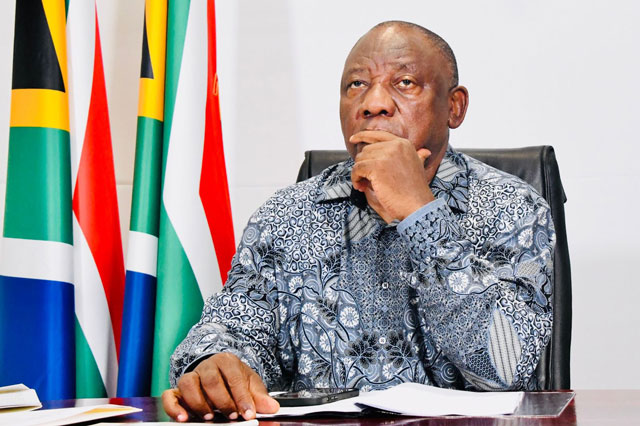Johannesburg – Many challenges face South African President Cyril Ramaphosain the aftermath of riots last July that left more than 350 dead, the worst unrest since the end of apartheid.
In his State of the Nation speech on Thursday, Ramaphosa acknowledged the government’s “responsibility” for the turmoil and vowed to overhaul the country’s security apparatus.
But in some areas, Ramaphosa’s room for fixing the problems is limited – in less than a year he has to ask his party to back him for a second term.
Here we look at the main issues:
Leadership shakeup
An inquiry on Monday blamed glaring failures by police and intelligence agencies for the unrest.
Ramaphosa told lawmakers: “This is a responsibility that we acknowledge and accept.”
“The report paints a deeply disturbing picture of the capabilities of our security services and the structures that exist to coordinate their work,” he said.
He promised a leadership shakeup of security agencies, including appointing new chiefs to the long-vacant top jobs at the state spy agency and the crime intelligence division.
He has already dissolved the security ministry and placed it firmly under his office, the first step in the reforms.
Police reform
In July, the Constitutional Court ordered former president Jacob Zuma to prison for refusing to testify before an anti-corruption commission.
Zuma’s incarceration sparked an outburst of violence that spread through his home province of KwaZulu-Natal and Johannesburg.
Initially his supporters took to the streets, but then others joined in with what became mass looting and riots — a reflection of South Africa’s poverty that only deepened during the pandemic.
Vigilantes took up arms as police appeared either to go missing or to be overwhelmed. Intelligence agencies were caught on the back foot. Days later 354 people had died as a result of the riots and some 50-billion-rand ($3.3-billion) had been wiped off the economy’s books.
Ramaphosa acknowledged the report’s most damning findings.
“Government’s initial handling of the July 2021 events was inept, police operational planning was poor, there was poor coordination between the state security and intelligence services, and police are not always embedded in the communities they serve,” he said.
Speed up investigation
At the time, Ramaphosa called the violence an “insurrection.” Some 2,500 people were initially arrested for various offences, including theft.
But six months later, only eight people have been prosecuted, according to the elite Hawks police unit. Investigations are still underway, and all the trials have been pushed back by months.
“I don’t think we are going to see any of the big fish caught,” said Guy Lamb, political scientist at the University of Stellenbosch.
Ramaphosa had promised to arrest the masterminds behind the violence. Police have said they suspect 12 people were the brains behind the unrest, but have given no details.
But police and soldiers did sweep through poor township neighbourhoods to confiscate looted goods.
Months later, the unprecedented deadly unrest had all but vanished from public debate, something analysts blame on the “habituation” of crime and murder in South Africa.
“South Africa has a ‘black lives don’t matter’ issue,” said David Bruce of the Institue for Security Studies. “Murder is not taken very seriously.”
Democracy ‘threat’
In an address to the ruling African National Congress last month, Ramaphosa warned that “divisions and factions” in the party “are becoming a threat to our democracy.”
The ANC had admitted that some of the people “inciting” the violence were their members, said the report, “but it is unclear whether disciplinary action was taken against such members.”
When the ANC meets in December to choose its leadership, Ramaphosa is expected to ask for re-election.
He has always had to deal with raucous rival factions within the party – but if he actually takes action against instigators, the party might toss him out.
The three-person panel of experts report warned that the factions in the ANC pose a threat to national stability.
Right now, analysts say his action has been statesmanlike given the low levels of public trust in the government.
“As a leader, at the moment, that was the right thing to do, to say ‘we failed and we are aware of the consequences and we are ready to solve this problem and prevent it from happening again’,” said Lamb.
“What we saw was a solid leader taking responsibility.”
Follow African Insider on Facebook, Twitter and Instagram
Source: AFP
Picture: Twitter/@PresidencyZA
For more African news, visit Africaninsider.com


